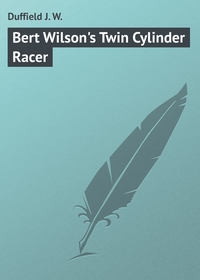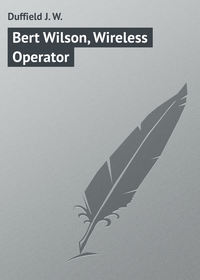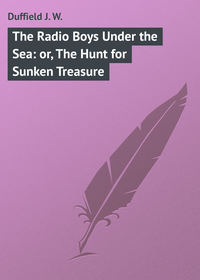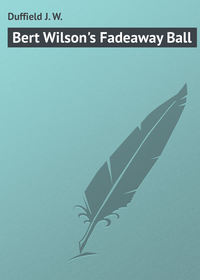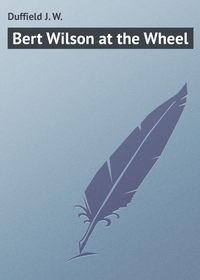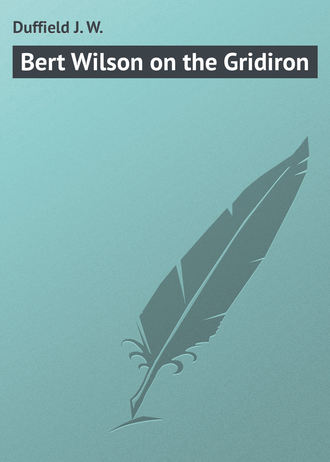 полная версия
полная версияBert Wilson on the Gridiron
"There were only two men in his way, and they made the mistake of keeping too close together, so that, as Lamar neared them, he made a superb dodge and slipped by both of them at once. Now he had a clear field before him, but with forty yards yet to go.
"How he ran! He had lost some time in the dodging and twisting, and now the whole Blue eleven were thundering at his heels. He could hear their panting as they sought to close in on him. The nearest one was not more than five feet away. He let out a link and fairly flew. The white lines of the field fell away behind him. One more tremendous effort by pursuer and pursued, and just as eager hands reached out to grasp him, he flashed over the goal line for a touchdown. Suddenly, brilliantly, inconceivably, the 'Greys' had won the game.
"Were we sore? We felt like draping the college buildings with crepe. To have had victory right within our reach and then to have had it snatched away in that fashion! Poor old Peters was fairly sick over it. I suppose to this day he has never forgiven himself for that sportsmanlike instinct.
"But nobody blamed him. The crowd took their medicine. Strictly speaking, I suppose it was foolish. As was said of the charge of the Light Brigade that 'it was magnificent but it was not war,' so, no doubt, many thought of Peters' move that although generous it was not football. Still the finest things in human life are often the 'foolish' things. At any rate, it enriched the history of the game with one of the most dashing and spectacular plays ever made.
"Those pesky 'Greys'," he mused. "They were always doing things like that. They had a fellow once that was always starting the fireworks. Poe was his name – a relative, by the way, of Edgar Allan Poe. I remember once, when with just one minute left to play and the ball thirty yards from our goal line, he dropped back for a kick and sent the ball sailing over the line for the goal that won the game. You've heard no doubt the song that the gloating 'Greys' made to immortalize a run down the field that he made on another famous occasion:
& never mortale Manne shall knoweHow ye Thynge came about —But from yt close-pressed Masse of MenneYe Feet Balle poppeth oute.& Poe hath rushed within ye Breache —Towards Erthe one Second kneeled —He tuckes ye Balle benethe hys Arme,& Saunteres down ye Fielde.Ye Elis tear in fierce pursuite;But Poe eludes yem alle;He rushes 'twixt ye quyvverynge Postes& sytteth on ye Balle.But Arthur Poe hathe kyckt ye balle(Oh woefulle, woefulle Daye.)As straighte as myghte Dewey's Gunnesupon ye fyrste of Maye.""They're foemen worthy of our steel, all right," laughed Dick.
"All the more credit in licking them," chimed in Tom.
"The percentage is on our side, after all," added Bert. "We've won about two-thirds of all the games we have played together."
"Some funny things happen in the course of a game," went on Mr. Quinby, who in this congenial company was feeling the years drop away from him and was enjoying himself immensely. "I remember once when our boys played Trinity in Hartford. At that time, the woolen jersey was part of the regulation football suit. This made tackling too easy, as one could get a good grip on the jersey, especially after it had been stretched in the course of the game. There had been some talk of substituting other material for it, but nothing had been done. You can imagine our surprise then when, on the day of the game, the Trinity men came out on the field in a full uniform of canvas. It was stiff and shiny and you couldn't get a good grip on it to save your life. That was bad enough, but, in addition, the Trinity boys had covered their uniforms with grease. Our fellows didn't tumble to it until after the game was under way and the enemy were wriggling away from us like so many eels. It was a time for quick thinking, but the Blues rose to the occasion. They sent out a hurry call for a bag of sand, and when it came, they grabbed handsful of it and so were able to get more or less of a grip on their slippery opponents. A rule was made later on forbidding the use of grease. The canvas uniforms, however, proved so much superior to the older style that it was officially adopted and has been in use ever since."
"How did the trick work?" asked Ralph. "Did they get away with the game?"
"No, we beat them all right, but by a close score and it certainly played hob with our tackling and interfering.
"Speaking of tricks, I remember one played by the Carlisle Indians. In addition to being crack football players, those 'noble red men' are about as smooth propositions as you'll find anywhere. The bland Ah Sin was a piker compared with them. You have to keep your eye peeled all the time. They were playing Harvard and the Indians got the ball on a kick off. There was a scrimmage, and when the crowd was untangled, the ball had disappeared. Suddenly, Dillon, of the Indians, darted out and made for the Harvard goal. But he didn't have the ball under his arm, and, after starting in pursuit, the Harvard boys thought it was a mere feint to draw them after him and turned back to see who really had it. Dillon went 105 yards down the field, running like the wind, and crossed the Harvard goal for a touchdown, and then they saw that he had the ball. And where do you think it had been all the time? Tucked up the back of his jersey. It had been enlarged especially for that purpose before the game began, and the first chance they had they worked the trick. The Harvard fellows raged, but there was nothing in the rules to forbid it and the touchdown counted. Since then the rules have been amended, and now the ball has to be in sight outside the clothing."
"He must have had a hunch that he would win," murmured Tom.
"Yes," assented Mr. Quinby. "A hunch on his back and a hunch in his heart. The Harvard boys had to stand for an awful joshing on the way they had been outwitted by 'Lo! the poor Indian with untutored mind.'
"But brain work and quick thinking aren't confined to the redskins. I recall a game played between the Army and Navy. You know there's always a fierce rivalry between those branches of Uncle Sam's service, and this game was being played for all it was worth. The Army had the ball and the fullback punted it to the center of the field. The Navy quarter tried to make a fair catch, but it slipped from his fingers. The Army center had run down under the kick and was close to the ball when it fell to the ground. The Navy men were so close behind that they would have piled on top of him if he had stooped to pick up the ball. So he kicked the ball ahead of him, following it up and ready to reach down and pick it up the minute he had the chance. But the Navy was so close that he had to keep dribbling it along and he kept this up until with one last kick he sent it over the goal and fell upon it for a touchdown. It was a new wrinkle in the game, and one of the hardest things in the world to get away with. They've tried it repeatedly since, but that feat of the Army man still stands as the star play of the 'dribbling' game.
"A good deal of the rough stuff has been cut out of the game and I'm glad of it, but in my college days almost everything 'went,' provided the referee wasn't looking. There was a lot of slugging and jiu-jitsu work, and more fellows had to be taken out of the game because of injuries than at present. Often a concerted effort was made to 'get' some especially efficient man on the other side, and they weren't always scrupulous about the way they did it. I remember one time we were playing a big game, and 'Butch' Allaire, the best player on the Blue team, had his knee badly hurt. We were short of good substitutes, and he felt that he had to continue playing, if it were at all possible. So, after a short wait, he came limping out again to his position, with a white bandage tied round his knee outside his uniform. To the other side, that bandage was like a red rag to a bull. They lunged against him, piled on top of him, and in every scrimmage they pressed heavily on that wounded knee. But, despite all their efforts, he played out the game, and we came out winners. After the excitement was over, the captain said to him:
"'Great work, Butch, but why in thunder did you wear that bandage on your knee? They knew just what to go for.'"
Butch grinned. "I tied it round the well knee," he said.
The boys laughed.
"Well," remarked Dick, "some of the prize-fighting tactics may have been rooted out of the game, but I'll bet the coaching is just as rough as it used to be."
"I'm not at all sure about that," said Mr. Quinby dubiously. "I'll admit that 'Bull' Hendricks is a finished workman when it comes to the use of pet names, after he's been stirred up by some bonehead play. But, after all, he doesn't use the paddle."
"Paddle!" came the exclamation in chorus.
"That's what I said. Paddle. In my day it was used by almost all the coaches, as an aid to quick thinking. Some advocate it even yet. The coach would take up his position right behind some line man when the ball was about to be put into play in practice.
"'Now, my son,' he would say, 'the minute the ball is snapped back I'm going to give you a fearful whack with this paddle. It's up to you to jump so fast that the paddle won't find anything to hit.'
"Did it work? I should say it did. Sometimes the paddle would catch him and sometimes it wouldn't, but after a few days of that the slowest of them would be off like a flash the instant the ball was snapped back. After that it wouldn't be necessary. They'd got the habit of a quick start. And you fellows know that that is the secret of good football, as it is of almost everything else – to get the jump on the other fellows.
"Nowadays, the methods are more often mental than physical. One coach I know works it something like this:
"'I want you to imagine that I have a loaded shotgun in my hand and that I am going to pull the trigger when the ball is snapped, and that you must get out of range before I fill you full of shot.'
"No doubt both methods help in the development of speed, but as between the two, my money goes on the paddle.
"But now," he said, as he made a motion to rise, "I'll have to go. I've had a bully good time with you fellows, but I'm keeping you from your studies and then, too, there are one or two of the old Profs I want to see before I turn in. I'll see you again before I go and I'll be there with bells on where the big games are pulled off. Good luck," and although they urged him to stay longer, he and Ralph took their leave.
"Great old sport, isn't he?" said Tom, when they were left alone.
"All to the good," replied Bert heartily.
"Let's hope that last 'good luck' of his was prophetic," remarked Dick.
"It's up to us to make it so," said Bert thoughtfully. "Of course there is such a thing as luck, but I've usually noticed that luck and pluck go together."
"O, I don't know," said skeptical Tom. "Sometimes a 'jinx' follows a man or a team, and everything goes against them. You've heard of the man
Whose horse went dead and his mule wentlame,And he lost his cow in a poker game,And a cyclone came on a summer dayAnd blew the house where he lived away.Then an earthquake came when that wasdone,And swallowed the ground that the housestood on.Then a tax collector, he came roundAnd charged him up with the hole in theground.""Some hard luck story, sure enough," grinned Bert. "Heaven forbid that any such hoodoo get after us. But, somehow, the result of the game to-day and Mr. Quinby's talk have braced me up, and I feel a mighty sight more hopeful than I did yesterday."
"Same here," acquiesced Dick. "I've a hunch that we're due to give the 'Greys' and 'Maroons' a great big licking. At any rate, if we lose, they'll know they've been in a fight, and we'll try to take our medicine gracefully."
"Spoken like a sport, old man," cried Bert, clapping him on the shoulder. "God loves a cheerful giver, but the whole world loves a cheerful loser."
CHAPTER IV
Breaking the Rules
"YES," remarked Tom, following up a conversation he and his two comrades had been engaged in for some time, "there's certainly something radically wrong with Martin, and personally I believe he's hitting the booze, or something just as bad. There's always some explanation when a fellow goes all to pieces the way he has, and ninety-nine times out of a hundred the answer is 'red-eye.'"
"I wouldn't be surprised if you were right, Tom," agreed Bert soberly, "and it's too bad, too. Martin has always been such a good scout that I hate to see him going back. What he needs is to have somebody give him a heart-to-heart talk and point out the error of his ways to him. But likely even that would do little good, anyway. When drink once gets a hold on a man it usually takes more than talk to break him of the habit."
"You can bet your hat it does," put in Dick. "I guess nobody who hasn't actually fallen a victim of the liquor habit and then broken himself of it can have any idea of the struggle necessary to do it. The only safe way is to let the 'stuff' strictly alone."
"Right you are," said Bert earnestly. "Everybody thinks that liquor will never get a grip on him. Oh, no! But what most people never take into account is the fact that every drink of whiskey taken weakens the will just a little, and makes it just so much harder to refuse the next drink. So it goes on, in increasing ratio, until it becomes next to impossible for the victim to break himself of the habit. My idea is, don't monkey with a red-hot poker and you won't get hurt. If you do, no matter how careful you may be, you're apt to get hold of the hot end, and then it's too late to wish you hadn't."
"My, Bert, you could get a job as lecturer for the W. C. T. U.," laughed Dick. "But just the same," he continued more seriously, "there's not a doubt in the world but what you're dead right. But the question is, if Martin, as we have reason to believe, has started drinking, what can we do to help him? Not only for his sake, but for the sake of the college. Without him on the team, we'd be so badly crippled that we wouldn't have a chance in the world to win the championship."
"I don't know what we can do, I'm sure," said Bert with a perplexed frown; "about all we can do is sit tight, and hope he'll see the error of his ways before he gets so bad that Reddy will have to fire him from the squad."
The others had no suggestions to offer, and after a little further discussion of the problem they gathered up their paraphernalia and went to their respective rooms.
The foregoing conversation took place on a Monday evening, and all the next day the three comrades saw comparatively little of each other, all being "up to their eyes in work," as Tom expressed it. But on Wednesday morning they happened to meet on the campus after the first lecture period, and Tom proposed that that evening, after supper, they take a ramble through the town after they had prepared their work for the following day.
"I'm beginning to feel stale," he complained; "Reddy won't let us go to a theater, of course, because that would keep us up too late. But I guess he'd have no objection to our taking a walk like that, provided we got back early."
"All right," said Bert. "I was just going to propose something of the kind myself. You'll come, won't you, Dick?"
"Surest thing you know," agreed that personage promptly. "What time do you want to go? About seven o'clock?"
The others were agreeable to this, and so the matter was settled. They talked a few minutes more, and then hurried away to the classrooms.
In accordance with this plan, they met at the appointed time in Bert's room, and sallied merrily forth. And indeed, it seemed as though these three needed no other entertainment than they could give each other. What with jokes, laughter, and "monkey-shines" the time passed very quickly, and they soon found themselves on one of the main thoroughfares of the town. They sauntered along, extracting amusement from everything they saw, and were about to return to the college, when Bert's laughing face suddenly grew grave.
They were approaching a brilliantly lighted saloon at the time, and Bert halted his companions with a gesture.
"What's up, Bert?" inquired Tom and Dick in surprise.
"I may be mistaken," replied Bert, "but I'm sure I saw Martin go into that place. And I should think, by the way he was walking, that he'd absorbed a few drinks already. What do you think we ought to do about it?"
"We might wait around until he comes out, and then give him a talking to," suggested Dick.
"No, I think that the best thing we can do is to go in and catch him red handed," said Bert. "It may make him so ashamed of himself that he'll cut out such things in the future."
"Well, perhaps that would be best," said Dick, and as Tom seemed to think so too, they decided to follow this course of action.
Accordingly, they made their way through the swinging doors, and found themselves in the brilliantly lighted interior of the saloon. Rows of glasses behind the polished mahogany bar sparkled in the light, and many mirrors reflected it, so that at first their eyes were almost dazzled. Nevertheless, they had little difficulty in locating Martin. He was leaning up against the far end of the bar, a whiskey decanter in front of him, and a glass a third full of the liquor in his hand.
Even as the boys watched him he raised the glass to his lips, and emptied the contents at two gulps. He was starting to pour out another portion when Bert walked swiftly up to him and laid his hand on his arm.
"Come on along out of this, Martin," he said; "we're all going back to the college now, and you'd better come back with us."
Martin turned toward him, but hardly seemed to recognize him. He was about to speak when the bartender, who saw a good customer being taken away from him, interfered.
"Aw, let de gent alone, can't youse," he said, in a belligerent tone; "he's got a right to take a drink or two if he wants to, ain't he? He don't look like no kid to need a guardian."
"You keep out of this," said Bert, with a steely glint in his eyes, "this is our business, not yours, and if you want to steer clear of trouble don't try to mix in."
The bartender seamed inclined at first to try the efficacy of force, but as Dick and Tom ranged up alongside Bert, he thought better of it.
"Awright," he grumbled, "awright. Take the guy along wid youse, an' I wish you joy of him."
Martin at first refused to move, but at last, by dint of much persuasion, the three comrades prevailed on him to go with them. Bert and Tom supported him on either side, guiding his uncertain footsteps to the best of their ability.
"I only hope we don't meet any one we know," said Dick fervently. "We'd better take a roundabout course going back, so as to take as little chance as possible of that happening."
"It wouldn't be a bad idea," said Tom, "and I think it would be a good stunt for me to go on ahead and do a little scouting. I could meet you at the east gate and let you know if the coast is clear. If possible, we want to get Mart to his room without anybody getting on to the state of affairs."
"All right, go ahead," acquiesced Bert, "we'll get there as soon as we can."
Accordingly Tom set off at a round pace, and soon came within sight of the college towers. Fortunately, there was a swimming contest going on in the natatorium, and many students who ordinarily would have been apt to be wandering about on the campus were indoors watching the swimmers. There was hardly a soul to be seen, and Tom prayed that the favorable conditions might last until Bert and Dick arrived with their unfortunate charge.
He hurried to the appointed meeting place, and strained his eyes through the darkness in search of the trio that he knew must be pretty near by this time. Sure enough, in less than five minutes they emerged from a neighboring street, and Tom walked swiftly up to them.
"We're in luck," he said, in a low tone. "Everybody's in the natatorium watching the swimming meet, and we've got the campus practically to ourselves. I'll walk in front of Martin, and the chances are we'll get him to his room without anybody getting wise."
Bert and Dick accordingly hurried Martin forward as fast as possible, and, as Tom had predicted, found everything favorable to them. They hurried across the deserted campus, and entered the dormitory in which Martin's room was located by a side door.
By the greatest good fortune they met no one in the corridors, and in a very few moments had the "high life" exponent safely in his room.
"Well, that's about all we can do to-night," said Bert, as they were leaving the room. "I think the best thing will be to let him sleep off the effects of his carouse, and then give him a talking to to-morrow."
"I think we'd better leave that to you," said Dick, after exchanging glances with Tom. "Probably if we all got at him at once, it would only make him obstinate. You do the talking for all of us, Bert. Show Mart what bad medicine he's been mixing, and maybe he'll come around to your point of view."
"Well," agreed Bert, but with evident reluctance, "I suppose that would be the best way to do it. I'll get hold of him some time to-morrow, and talk to him like a Dutch uncle."
Accordingly, the next day he was on the lookout for the backslider. Several times in the course of the day he saw him, but Martin always managed to avoid him, more by design than accident, as Bert thought. At last, however, after the last recitation period, he cornered him in a secluded corner of the campus.
"I guess you know what I want to say to you, don't you, Mart?" he inquired gravely.
"Oh, yes, I guess I know, all right," the other replied sullenly, "but there's no use your preaching to me about the evils of drink, or anything like that. I've tried to cut out the stuff, and I can't, that's all. I'm going to Reddy to-night and resign from the team."
"You're not going to do anything of the kind," said Bert gravely, "you're going to keep right on being the best halfback the college ever had, but I'm going to ask a personal favor of you on behalf of myself, and also Trent and Henderson."
"I think I know what you mean," said Martin suspiciously, "but fire away and ask it."
"We want you to go to Reddy and make a clean breast of it, ending up by promising to do your best to cut out the 'stuff,'" said Bert. "Will you do it? Don't say no now," as the other started to shake his head, "don't give me an answer now, if you don't want to. Think it over. I'm mighty sure if you think hard enough you'll do what we want you to."
"I'll do it!" exclaimed Martin, suddenly thrusting out his hand, "and I'll let the booze alone in the future if it takes a leg. You and the others have done me a bigger service than you'll ever realize, probably."
"Well, you know the way you can best repay it," said Bert, with a hearty smile, and after another strong handclasp they parted.
Bert went straight to Dick and Tom, and told them what he had accomplished. "I think he'll keep his word, too," he finished. And as it proved, he, was right. From that day forward Martin reported regularly for practice, and kept strictly to training table regulations. In less than a week he was back to his old time form, and became as he had been before, one of the mainstays of the team.
CHAPTER V
Tackling the Army
"THIS looks like a case of bearding the lion in his den," remarked Dick, as the stately steamer on which they had embarked at New York that morning swept up to the landing at West Point, and the boys were gathering up their traps to go ashore.
"It's certainly a stiff contract to tackle the future leaders of the United States Army," replied Tom. "But we're the boys to do it, and to lick them, too. If that be treason, make the most of it."
"Don't you be too sure of that," admonished Bert. "From all I hear, they're a husky set of brutes, and we're likely to have our hands full. They've never been easy picking and we'd better postpone our jubilee till after the game."
"Punk philosophy," countered Tom. "Let's have it now and make sure of it."
He was clearly a hopeless case, and they gave up the task of subduing his levity, and started for the gang plank.
It was a large party that had come up the river on that glorious day in early October, to test the prowess and mettle of the cadets. The team itself with the substitutes numbered over thirty, and there was a small army of rubbers and other attendants. To these were added several hundred of the college boys, and these were further reinforced by a host of "old grads" who sniffed the battle from afar and couldn't resist the temptation to "come on along," and root for the youngsters on their scalp-hunting expedition.


